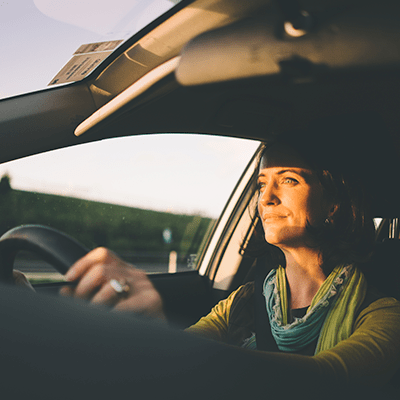Three simple ways to stay safer on the road
Changing the radio station, taking a sip of water, setting the GPS, or even dealing with back seat squabbles. Some driving distractions may seem insignificant, but even a moment away from the task at hand can have devastating consequences.
Which makes the findings of a new landmark study all the more disturbing. The Monash University Accident Research Centre filmed hundreds of drivers inside their vehicles over nearly two million kilometres as part of the Australian Naturalistic Driving Study. It found drivers were distracted 45 per cent of the time and that driver distraction is the cause of about 16 per cent of all serious crashes.
Distractions on the road
Every 96 seconds a driver was distracted by something other than the road ahead, a progress report on the study found. Six per cent of these non-driving tasks captured on video led to near misses. This included drivers braking sharply, swerving into the next lane, forgetting to indicate, or failing to stop for a pedestrian.
 Most of the incidents were caused by distracted motorists who had been texting and talking on a phone, engaging in personal hygiene or reaching for an object.
Most of the incidents were caused by distracted motorists who had been texting and talking on a phone, engaging in personal hygiene or reaching for an object.
Distractions, speed and keeping your distance from the vehicle in front of you are all very common factors in the accidents we hear about in our motor claims area, says Norm Casamento, QBE National Manager, Motor Claims.
“From our regular comprehensive car insurance holders, to motorcyclists and even in our heavy haulage area, it’s an all too familiar story,” Casamento says. “I just looked down to grab a drink of water and that’s when the accident happened.”
Keep your distance
Keeping a safe distance of two seconds from the car in front is the minimum to stay safe on the road, according to Casamento.
“Remember that if you’re distracted, and you look away from driving then you’ve already lost the benefit of keeping that distance. It’s gone just like that,” he says.
“Distance from the car in front is all about braking speed and having enough time to stop. Work on the basis of two seconds in dry or ideal conditions and then add another second for every three metres of trailer when towing a trailer or caravan.
“You also need to factor in the heavy vehicles driving near you, for example, that B double truck is going to take longer to stop so use common sense and leave more space.”
Small accidents still matter, he says.
“The majority of our smaller claims end up costing less than $10,000 to repair. As anyone who has ever had even a minor car accident will tell you, it’s an inconvenience to have your car repaired.
“We have a great network of smash repairers who help our customers get their cars back on the road quickly, but there is still, by definition, disruption to their normal routine.”
And the vast majority of those little incidents are mainly down to rear-enders brought on by distractions, he says.
Slow down and stay safe
Speed is a factor in many car accidents, says Casamento.
“The importance of keeping to the speed limit cannot be overstated. Slowing down and using common sense, will make the roads safer for all.
“Be considerate to all road users,” Casamento says. “We’re all in such a rush, but ultimately we’re putting ourselves, our families and each other at risk when we drive too fast.
“Don’t tailgate, keep a safe distance, put away your phone and when you’re tired make sure you take regular breaks, especially on long drives during peak holiday times.”
Holiday driving can be stressful, but there are things you can do to help make the journey safer,” Casamento says.
Speed limits on freeways and motorways can change, especially if road work is ongoing, which is often the case during holiday periods. “Look out for these changes, which can typically take you from a 110 kilometre an hour zone, down to 80 kilometres an hour or even down to 50 kilometres an hour,” he says.
Casamento has some other practical tips for motorists too.
“Turn off your phone and put it in the back seat or somewhere you won’t be tempted to check it or touch it,” he says.
You may be driving somewhere unfamiliar so a satnav may come in handy, but don’t rely solely on the satnav to get you there, he says. “I’m not suggesting you go back to using old fashioned maps, but it is a good idea to spend some time planning your route before you leave and make sure you have more than just a vague idea of where you’ll be travelling,” he says.
“You’ll also be able to plan out your breaks and know when and where to stop to break up the trip so you don’t get tired."
Tips to keep you safe on the road:
- Slow down and stick to the speed limit
- Keep your distance from the car in front
- Turn off your phone and put it away while driving
- Be mindful of distractions
- Plan your journey before you leave home
- Take regular breaks, at least one every two hours.









